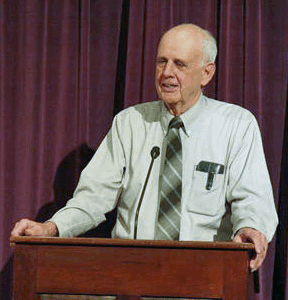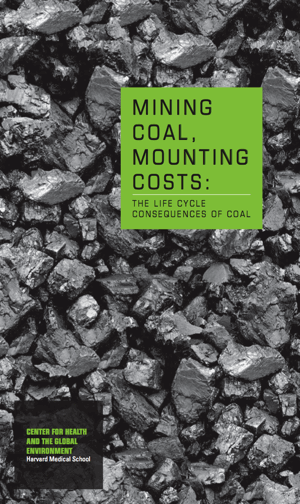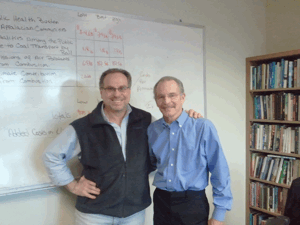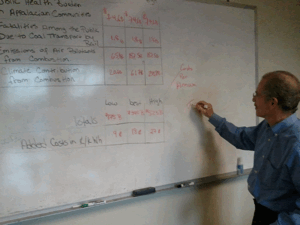Costs of Coal
Air Date: Week of February 18, 2011

Harvard Medical School’s Dr. Paul Epstein. (Photo: Bruce Gellerman)
Extraction, processing, transportation and combustion of coal create large tolls on the environment and human health. We hear from poet and farmer Wendell Berry who slept in the Kentucky governor’s office to protest mountaintop removal. Host Bruce Gellerman also talks with Dr. Paul Epstein from Harvard University’s Medical School about his new study measuring the true costs of coal.
Transcript
Left aligned picture
GELLERMAN: Wendell Berry is a celebrated poet and essayist, a full time farmer in Henry County, Kentucky - and a part-time protestor. On a recent Friday afternoon, Berry and 13 other demonstrators occupied the office of the Governor of Kentucky to protest mountain top removal.
That’s the method mining companies use where they blast the summits off of coal rich mountains, extract the coal, and dump the debris in rivers and valleys below. Wendell Berry says when the demonstrators arrived to occupy the governor's office - they got an unexpected welcome.
BERRY: He invited us to be his guests in his reception room for the weekend. The weekend turned out to be - for all of us - a wonderful experience. It would have been a wonderful experience if we had only each other’s company. But, it turned out, we had several times more food than we could eat. People sent in blankets, pillows, mattresses, toothbrushes, and even equipment to give every one of us a massage.
GELLERMAN: (Laughs).
BERRY: So, it was a weekend of wonderful camaraderie with one another.

Farmer, Author and activist, Wendell Berry at the Frankfort, Indiana Community Public Library, 4 November 2005. (Wikipedia Creative Commons)
GELLERMAN: So why did you occupy the office of the Governor of Kentucky?
BERRY: Because the issue is very large and very urgent: that is, the destruction of the coalfields of eastern Kentucky, by surface mining at its most violent, which is to say - mountaintop removal.
GELLERMAN: Well, what did you want the Governor to do about it?
BERRY: You have to understand - our complaint is in the context of a virtual dead-silence for many years on the part of state government. We have done everything we could think of to get a hearing - without any effect whatsoever. So this was simply the next thing if we were going to continue our opposition to those mining practices.
GELLERMAN: So you went to the Governor’s office - did you expect to stay for four days?
BERRY: We expected that we would be arrested. Everything that happened was unexpected. We went expecting that the Governor probably would not speak with us, but he did. We went expecting that he would not agree to anything we asked of him, and he did agree to two of our requests.
One, that he would visit the home places of a number of our members and see for himself the problems that they endure everyday. And he agreed to deplore the use of violent language against the people on our side. I think that our weekend was a success to the extent that we did make the issues more public than they’ve been before. We’ve taken a step, and I don’t know how big a step it is, but we’re farther ahead in our efforts than we were last Friday morning.
GELLERMAN: I understand that you took in a copy - a well-worn copy - of Shakespeare’s “The Tempest.” Why?
BERRY: Because it fit very comfortably inside my jacket. And when I am in strange circumstances, such as the Governor’s office, I take a great deal of comfort from reading Shakespeare.
GELLERMAN: Is there a message, a part of the passage that is appropriate for the protest?
BERRY: (Laughs). I hit on a line in my reading of the “Tempest” that I then read to my associates. The line is: ‘misery makes for strange bedfellows.’ (Laughs). We all appreciated the appropriateness of it, but we also appreciated that none of us was miserable.
GELLERMAN: Well, Mr. Berry, I appreciate you talking with us. Thank you very much.
BERRY: Thank you very much.
GELLERMAN: Poet and protester Wendell Berry. He's back on his farm after demonstrating against mountain top removal in Kentucky. Well, mining is just one of the costs of coal, but there are others. There's the cost of transporting, processing, and burning coal - but these aren’t reflected in the price consumers pay.
Dr. Paul Epstein, Associate Director of the Center for Health and Global Environment at Harvard Medical School, has calculated the real cost of coal. And he recently dropped by to do the numbers.
[BELL…. “I’ll get it…”]
EPSTEIN: Is Bruce Gellerman here?
GELLERMAN: Hi, Dr. Epstein, I’m Bruce.
EPSTEIN: Good to meet you!
GELLERMAN: Well, thank you for coming in! I thought since we have so many numbers to talk to you about, we’d go to the Living on Earth conference room, and we’ve got a whiteboard there, and you can write up a storm.

EPSTEIN: We’ll fill it up.
GELLERMAN: (Laughs). Okay, come on.
[DOOR CLOSING]
GELLERMAN: So we invited Dr. Paul Epstein to Living on Earth to discuss his new study about the true costs of coal. Nearly half of the electricity in the United States comes from coal, because it’s the cheapest fuel. But, Dr. Epstein, you say that ain’t so.
EPSTEIN: What we pay for coal makes it seem like it’s cheap, but the cost to taxpayers - to the general public in terms of health and
environmental impacts - are enormous.
GELLERMAN: Economists call those externalities.
EPSTEIN: These are externalities, because it’s external to what we pay the coal companies and the power companies - hidden costs of coal.
GELLERMAN: Well, we put a grid here on the whiteboard, and we left some open spaces. We copied this from your study, and you have a lot of categories, I guess about eight or nine categories of the ‘hidden costs’. Let’s deal with the first one: the public health burden in Appalachian communities. What’s that?
EPSTEIN: Well, this is the impacts of air pollution and water pollution, primarily.
GELLERMAN: So what’s the price tag for that?
EPSTEIN: We’ve added up the deaths - about 75 billion dollars per year.
GELLERMAN: It’s billions!

Dr. Paul Epstein and LOE host Bruce Gellerman. (Jessica Ilyse Smith)
EPSTEIN: These are billions of dollars per year…is what we’re finding it costs the population in terms of their deaths.
GELLERMAN: And this is just in Appalachia!
EPSTEIN: This is just in Appalachia. We’re not talking about Wyoming, or Colorado, or other places in the nation that also mine coal - about 75 billion dollars per year.
GELLERMAN: You have fatalities among the public due to coal transportation by railroad.
EPSTEIN: So we looked at the whole life cycle. Mining - meaning mountaintop and underground, transport to the processing plants, transport in railways to the coal combustion plants. Seventy percent of our railway traffic is coal in this nation.
Think of all the wonderful things we could be doing with all those rail cars for getting around and so on. But, just because of that transport, that has a number of fatalities, and that’s what gives us this figure of 1.8 billion in terms of lives lost from accidents due to coal transport by rail.
GELLERMAN: Now, you have emissions of air pollutants from combustion.
EPSTEIN: Now this is the one that gets most attention. This is the noxes and the soxes and the ozone and the particulate matter. Every time we look at particulate matter, we are appreciating that even very low values affect cardiovascular and lung disease. So these are the deaths from air pollution - what you think of when you think of coal.
[EPSTEIN WRITES ON THE WHITEBOARD]

Dr. Epstein does the numbers. (Photo: Bruce Gellerman)
EPSTEIN: 187.5 billion is our best estimate, per year, that’s attributable to air pollution.
GELLERMAN: You write that, as the levels of coal mining increase in Appalachia, so do the poverty rates and unemployment rates in the area. How is that?
EPSTEIN: Yeah, it seems counter-intuitive, but in fact, the dominant form of mining that is increasing now is the mountaintop removal. And this employs very few people, higher-skilled folks that are driving Caterpillars to move earth and dig up the mountain and blast it away… so, in West Virginia, for instance, it’s less than one percent of the population that is employed in coal today.
GELLERMAN: Okay, then we have climate contribution from combustion. This would be…greenhouse gasses?
EPSTEIN: Just mountaintop removal removes trees - it removes soil, and just from that we get carbon. And then methane’s released from some of the mines. This in itself is contributing to climate change - just the mining.

Harvard Medical School’s Dr. Paul Epstein. (Photo: Bruce Gellerman)
When we look at the burning of coal, we’re talking about carbon dioxide, methane, and we’re also looking at black carbon, soot, or particulate matter, which traps heat in the atmosphere. So, looking at the climate contribution of just combustion, we get a range based on what’s called the ‘social cost of carbon’ - what comes out to 205.8 billion dollars a year.
GELLERMAN: Real money! So if we were to take the true value of the cost of electricity, it would be a lot more.
EPSTEIN: So all of that adds up to somewhere between a third and a half a trillion dollars per year that we can attribute are the external costs of coal. We estimate this would double or even quadruple the cost of coal that we would pay in cents per kilowatt-hour. Coal becomes very expensive if we look at these external costs, and it makes wind and solar and smart-grid highly competitive.
GELLERMAN: Well, Dr. Epstein, thank you very much for coming in, I really appreciate it.
EPSTEIN: Thank you, Bruce.
Watch Dr. Epstein explain his figures for the true costs of coal. (Jessica Ilyse Smith)
GELLERMAN: Dr. Paul Epstein is the Associate Director of the Center for Health and the Global Environment at Harvard Medical School, and lead author of the study “Full Cost Accounting for the Lifecycle of Coal.” It’s in the latest edition of the annals of the New York Academy of Sciences.
Links
Harvard Medical School’s Center for Health and the Global Environment
Living on Earth wants to hear from you!
Living on Earth
62 Calef Highway, Suite 212
Lee, NH 03861
Telephone: 617-287-4121
E-mail: comments@loe.org
Newsletter [Click here]
Donate to Living on Earth!
Living on Earth is an independent media program and relies entirely on contributions from listeners and institutions supporting public service. Please donate now to preserve an independent environmental voice.
NewsletterLiving on Earth offers a weekly delivery of the show's rundown to your mailbox. Sign up for our newsletter today!
 Sailors For The Sea: Be the change you want to sea.
Sailors For The Sea: Be the change you want to sea.
 The Grantham Foundation for the Protection of the Environment: Committed to protecting and improving the health of the global environment.
The Grantham Foundation for the Protection of the Environment: Committed to protecting and improving the health of the global environment.
 Contribute to Living on Earth and receive, as our gift to you, an archival print of one of Mark Seth Lender's extraordinary wildlife photographs. Follow the link to see Mark's current collection of photographs.
Contribute to Living on Earth and receive, as our gift to you, an archival print of one of Mark Seth Lender's extraordinary wildlife photographs. Follow the link to see Mark's current collection of photographs.
 Buy a signed copy of Mark Seth Lender's book Smeagull the Seagull & support Living on Earth
Buy a signed copy of Mark Seth Lender's book Smeagull the Seagull & support Living on Earth

